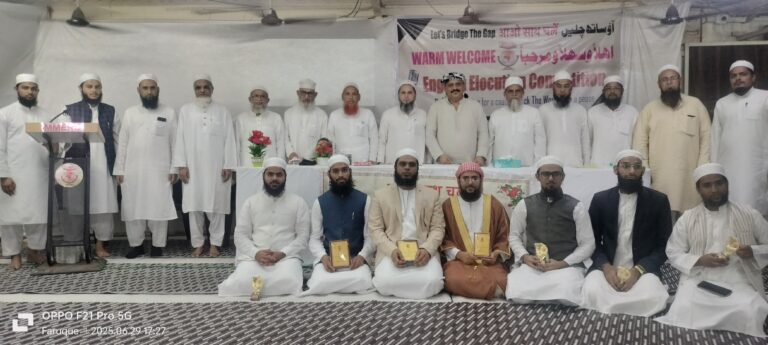
Why We Should Keep Fast
Muhammad Osama Shahid Samastipur
Keeping fast means to abstain from eating drinking and sexual contact from dawn to sunset. It is one of the important pillars and foundations of Islam, as Allah Almighty says:
“يَا أَيُّهَا الَّذِينَ آمَنُوا كُتِبَ عَلَيْكُمُ الصِّيَامُ كَما كُتِبَ عَلَى الَّذِينَ مِن قَبْلِكُمْ لَعَلَّكُمْ تَتَّقُونَ”.
“O you who believe, the fasts have been enjoined upon you as they were enjoined upon those before you, so that you may be God-fearing,”(Chapter 2:verse:183)
The Messenger of Allah (ﷺ) has similarly said, “(The structure of) Islam rests on five (pillars): Testification of ‘La ilaha illallah’ (none has the right to be worshipped but Allah), that Muhammad (ﷺ) is His slave and Messenger, establishment of Salah, payment of Zakat, the pilgrimage to the House of Allah (Ka’bah), and Sawm during the month of Ramadan.”
Besides, books of hadith are full of virtues of fasting. Such as, a hadith recorded by Abu Daud says:
If anyone fasts during Ramadan because of faith and in order to speek his reward from Allah, his previous sins will be forgiven for him.
In addition, fast creates a feeling of sympathy, tolerance and understanding others’ sorrows. It requires us hardship, thirst and hunger, so that we care for those who are thirsty and hungry in our society. It strengthens the bond of brotherhood and equality among all men kind.
Above all, the reward of keeping fast is Allah Almighty Himself. So, let’s get ready seek nearness to Allah through fasting and avail the virtues of Ramadan.
You May Also Like
 EDUCATION
EDUCATIONJamia Islamia Banjari Witnesses a New Chapter in English Oratory
Jamia Islamia Banjari Witnesses a New Chapter in English Oratory EC News Desk 14/07/2025...
 Breaking News
Breaking NewsMMERC Conducts 1st English Elocution Competition of the Academic Year 2025–26
MMERC Conducts 1st English Elocution Competition of the Academic Year 2025–26 "It is extremely...
 Articles
ArticlesThe Soul of Knowledge Dwells in the Pages of Books
The Soul of Knowledge Dwells in the Pages of Books By: Mohammad Taukir Rahmani...
 Breaking News
Breaking NewsThe First-Ever English Elocution Competition at Jamia Islamia Banjari, Indore
The First-Ever English Elocution Competition at Jamia Islamia Banjari, Indore EC News Desk 03/01/2025...
 Breaking News
Breaking NewsArabic Elocution Competition Held at Jamia Islamia Banjari
Arabic Elocution Competition Held at Jamia Islamia Banjari EC News Desk 27/12/2024 On 26th...
 Breaking News
Breaking NewsAdmission Opens for English Medium Markaz Online Madrasa
Admission Opens for English Medium Markaz Online Madrasa Mohammad Taukir Rahmani EC Exclusive Markaz...

Comments (14)
Leave a Comment
hello!,I like your writing so much! share we communicate more about your post on AOL? I require an expert on this area to solve my problem. Maybe that's you! Looking forward to see you.
Enjoyed studying this, very good stuff, thanks.
Hello my family member! I wish to say that this post is awesome, great written and come with almost all significant infos. I?¦d like to peer more posts like this .
I gotta bookmark this website it seems very helpful very useful
I just like the helpful info you provide on your articles. I’ll bookmark your blog and take a look at once more right here frequently. I am rather sure I will be told lots of new stuff right right here! Best of luck for the following!
very good post, i certainly love this web site, keep on it
you've an excellent weblog right here! would you wish to make some invite posts on my blog?
Yeah bookmaking this wasn't a bad decision great post! .
Hi there! This post couldn’t be written any better! Reading through this post reminds me of my previous room mate! He always kept talking about this. I will forward this article to him. Pretty sure he will have a good read. Thank you for sharing!
Terrific paintings! This is the kind of info that should be shared across the web. Disgrace on Google for no longer positioning this publish higher! Come on over and seek advice from my website . Thank you =)
Hmm it seems like your site ate my first comment (it was super long) so I guess I'll just sum it up what I wrote and say, I'm thoroughly enjoying your blog. I as well am an aspiring blog writer but I'm still new to everything. Do you have any points for novice blog writers? I'd definitely appreciate it.
I know this if off topic but I'm looking into starting my own weblog and was wondering what all is required to get setup? I'm assuming having a blog like yours would cost a pretty penny? I'm not very web smart so I'm not 100 certain. Any tips or advice would be greatly appreciated. Thanks
I reckon something genuinely special in this web site.
Enjoyed looking through this, very good stuff, regards.